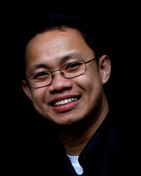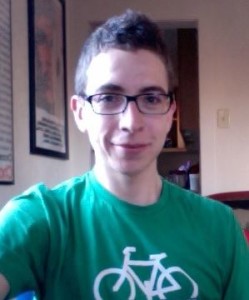In 2014, we received a total of 65 applications from Ph.D. candidates and awarded 4 stipends (ranging from $3500 up to $10,000) in support of research on civil resistance, including relevant case studies. The goal of the stipend is to assist awardees in expanding their analytical, empirical and methodological tools of inquiry and incorporate into their Ph.D. thesis writing a civil resistance perspective — its literature, as well as theoretical and strategic frameworks.
2014 Ph.D. Fellowship awardees include:
 Laurence L. Delina is a PhD Candidate at the Institute of Environmental Studies at the University of New South Wales in Sydney (UNSW Australia). The focal theme of his research is on the governance of climate mitigation, with particular attention to the strategies for sustainable energy transition. His PhD work on the social, cultural and institutional dimensions of rapid climate mitigation is being supervised by A/Prof Mark Diesendorf, author of Climate Action: A Campaign Manual for Greenhouse Solutions (UNSW Press, 2009). The focus of his PhD project is on the non-technical approaches necessary to push and support urgent, rapid and effective climate action. He is an author of several articles and chapters and a co-author of an Assessment Report on Energy Efficiency Institutions (United Nations, 2010). He received his civil engineering and M.P.A. degrees from Mindanao State University in General Santos City and an M.A. from the University of Auckland. He had consulted for the University of Manchester and the United Nations Economic and Social Commission for Asia and the Pacific. In Spring 2013, he held a Visiting Fellowship at Harvard Kennedy School. He is currently an Earth System Governance Research Fellow and a Research Associate at the Center for Governance and Sustainability at the University of Massachusetts Boston.
Laurence L. Delina is a PhD Candidate at the Institute of Environmental Studies at the University of New South Wales in Sydney (UNSW Australia). The focal theme of his research is on the governance of climate mitigation, with particular attention to the strategies for sustainable energy transition. His PhD work on the social, cultural and institutional dimensions of rapid climate mitigation is being supervised by A/Prof Mark Diesendorf, author of Climate Action: A Campaign Manual for Greenhouse Solutions (UNSW Press, 2009). The focus of his PhD project is on the non-technical approaches necessary to push and support urgent, rapid and effective climate action. He is an author of several articles and chapters and a co-author of an Assessment Report on Energy Efficiency Institutions (United Nations, 2010). He received his civil engineering and M.P.A. degrees from Mindanao State University in General Santos City and an M.A. from the University of Auckland. He had consulted for the University of Manchester and the United Nations Economic and Social Commission for Asia and the Pacific. In Spring 2013, he held a Visiting Fellowship at Harvard Kennedy School. He is currently an Earth System Governance Research Fellow and a Research Associate at the Center for Governance and Sustainability at the University of Massachusetts Boston.
Tentative title: Rapid climate mitigation: what we can learn from rapid socio-economic restructurings
Abstract: Climate science suggests that, to avoid major impacts from climate change, global greenhouse gas emissions must peak by 2020 and be reduced to close to zero by 2040 or 2050. The PhD research project seeks to identify the non-technical measures needed to achieve rapid and effective reduction in greenhouse gas emissions. The project commences the process of developing contingency plans for governments, peoples, and the climate action movement. The work falls into two parts. The first part considers a possible scenario in which a sudden major global climate impact galvanizes governments to implement emergency climate mitigation programs. It draws upon historical accounts of socio-economic restructurings in several countries during World War 2. Contingency plans for governments using wartime mobilization as policy blueprint have already been developed and was published in an article in Energy Policy. Since most governments seem unlikely to take rapid and effective action without very strong pressure from their peoples, the second part of the research examines the prospect for strengthening the grass-roots climate action movement. Using recursive assessment and process tracing methods, the historical literature on large-scale nonviolent social movements is distilled to identify panoply of conditions and strategies that led to effective or ineffective campaigns in the past. The identified strategies are then verified and triangulated vis-à-vis their temporal relevance for contemporary civil resistance via an online questionnaire for social action groups of our time. The results are then used to design a basket of strategies that could strengthen the climate action movement.
______________________________
 Deshonay Dozier’s research, organizing, and art is concerned with working and surplus class-based alternative relations to policing, property and land, collective identity, and social and economic development. Dozier holds a B.A. from California State University, Northridge where she studied civil resistance with Reverend James Lawson. Currently, Dozier is a PhD Student in Environmental Psychology at the Graduate Center, CUNY. She is also a Graduate Teaching Fellow in the Department of Urban Affairs and Planning at Hunter College.
Deshonay Dozier’s research, organizing, and art is concerned with working and surplus class-based alternative relations to policing, property and land, collective identity, and social and economic development. Dozier holds a B.A. from California State University, Northridge where she studied civil resistance with Reverend James Lawson. Currently, Dozier is a PhD Student in Environmental Psychology at the Graduate Center, CUNY. She is also a Graduate Teaching Fellow in the Department of Urban Affairs and Planning at Hunter College.
Tentative Title: A Blues Geography: Mapping Conflicting Development in Downtown and South Los Angeles
Abstract: This dissertation conceptually and empirically maps the blues development tradition (alternative development) of working, poor, and surplus class populations practices against hegemonic development practices Los Angeles. In looking at moments of crises/contradiction in regional development, and its effects of movement/displacement and enclosure, this research applies a cross-scalar analysis centering a social critique, social movements, and the planning and envisioning of alternative development.
Downtown and South Los Angeles maps a corridor of poverty. Adjacent to the now booming transit, real-estate, commercial, and the University of Southern California redevelopment aims, the neighborhoods of Skid Row and Historic South Central are in threat of eviction, displacement, and dispossession. The collective memory of prior displacement aims decades before, along with the lack of jobs, quality housing, and community control of resources, have left residents to resist and rework this socio-spatial landscape through their planning desires. Currently, in Skid Row, residents of the second largest concentration of housed and unhoused Blacks work to resist punitive policing through claiming property and housing rights. And in Historic South Central, policing as well as blight from subprime lending in the foreclosure crisis, has prompted Latina/o residents to work towards land acquisition to build affordable housing, develop worker-owned cooperatives, and communities spaces. But these efforts are more than just a response to crises but have a legacy, a tradition. The research landscapes the historical and current traditions of development (both alternative and hegemonic) and the contested dimensions of the making and unmaking of Downtown and South Los Angeles.
______________________________
 Marcio Pessôa is a researcher, journalist and a writer whose main area of focus is nonviolent resistance of civil society and governance in Southafrican countries. Currently Pessôa is a PhD Candidate at the Institute of Development Studies in the University of Sussex in Brighton where he researches civil society in Mozambique. He holds a Master Degree in Democratic Governance and Civil Society at the University of Osnabrueck in Germany. His thesis embraced the landscape of nonviolent resistance of civil society in Zimbabwe from 1980 until 2010. Pessôa works for international media company – DW, covering Africa related subjects. Additionally, he is a consultant for developing countries’ organizations where he advises on matters of governance, public security, human rights and media. Marcio Pessôa recently published his first book – “Banguela”, which is a result of six year long journalistic investigation of public security system and organized crime in South of Brazil. In Brazil, Pessoa is a prominent journalist who has been recognized with many national and international prizes in the field of Human Rights. His dedication to media is not only visible in his professional work, but also by being a collaborator for media democratization projects in Brazil.
Marcio Pessôa is a researcher, journalist and a writer whose main area of focus is nonviolent resistance of civil society and governance in Southafrican countries. Currently Pessôa is a PhD Candidate at the Institute of Development Studies in the University of Sussex in Brighton where he researches civil society in Mozambique. He holds a Master Degree in Democratic Governance and Civil Society at the University of Osnabrueck in Germany. His thesis embraced the landscape of nonviolent resistance of civil society in Zimbabwe from 1980 until 2010. Pessôa works for international media company – DW, covering Africa related subjects. Additionally, he is a consultant for developing countries’ organizations where he advises on matters of governance, public security, human rights and media. Marcio Pessôa recently published his first book – “Banguela”, which is a result of six year long journalistic investigation of public security system and organized crime in South of Brazil. In Brazil, Pessoa is a prominent journalist who has been recognized with many national and international prizes in the field of Human Rights. His dedication to media is not only visible in his professional work, but also by being a collaborator for media democratization projects in Brazil.
Tentative title: Defiant Civil Society in Sub-Saharan Africa – a case study of Mozambique
Abstract: This research will examine the existence of ‘defiant civil society’ phenomena in Mozambique. It will focus on civil society organizations’ role in the struggle for a governance system capable of responding to the social justice claims of the popular ‘moral economy.’ Specifically, the study will analyse the defiance and latency of defiance in civil society, considering organizations’ interests, ideology and relationship with the state. This case study is inspired by ‘Moral Economy’, ‘Theory of Power’ and ‘Competitive Authoritarianism’ theories. It examines the role of factors relating to the moral economy and competitive authoritarianism in shaping the actions of ‘defiant civil society,’ examining the extent to which the types of defiance observed in Mozambique exist. The methodological framework is founded on multi-sited ethnography which understands both practice and product. Fieldwork will be conducted in Mozambique over a period of 6 months.
______________________________
 Michael S. Wilson is a doctoral fellow at the University of California, Santa Cruz, where he focuses on peace and conflict in Latin America. His dissertation project is a comparison of social movements emerging against resource extraction. A Mexico City native, Wilson is a writer, educator, and activist. Some of his academic and journalistic works have appeared in the Human Rights Review, Tikkun Daily, Counterpunch, Windsor Student Movement, The Bitchin’ Kitsch, SCENE Magazine, The Pointer Newspaper, and Socialist Worker, among others.
Michael S. Wilson is a doctoral fellow at the University of California, Santa Cruz, where he focuses on peace and conflict in Latin America. His dissertation project is a comparison of social movements emerging against resource extraction. A Mexico City native, Wilson is a writer, educator, and activist. Some of his academic and journalistic works have appeared in the Human Rights Review, Tikkun Daily, Counterpunch, Windsor Student Movement, The Bitchin’ Kitsch, SCENE Magazine, The Pointer Newspaper, and Socialist Worker, among others.
Tentative title: Persuasive Protest: Discursive Frames, Trans-local Links, and Nonviolent Strategies in Latin American Resource Conflicts
Abstract: Most of human society is subject to a type of ‘growth’ that is increasingly globalized, consumerist, and energy-intensive. An integral part of this paradigm is intensified resource exploitation, which has led many people across the Global South, especially those located near these resources, to experience disruptions to their daily lives. Such threats or opportunities can galvanize communities to form coalitions and contest their rights from the streets to courtrooms, from scientific reports to internet blogs. This dissertation relies on a qualitative comparison of four in-depth cases of recent socioenvironmental conflicts from Latin America—in Brazil, Peru, Costa Rica, and Chile—to investigate how groups involved select from a range of strategies and tactics to advance their positions and persuade supporters. It particularly focuses on three aspects of their organizing strategies: their direct actions, their discursive frames and use of different media, and their other work to attract prospective allies, both locally and across long distances. Through this study, I seek to build theory about the configurations that help carry out a transition from violence to nonviolence, and from conflict towards successful reconciliation. Expanding our understandings of how groups frame themselves and seek allies, why project supporters and opponents choose among and respond to strategies, and how various actors can help transform conflicts, will contribute to the fields of sustainable development, nonviolent resistance, and peaceful conflict resolution.